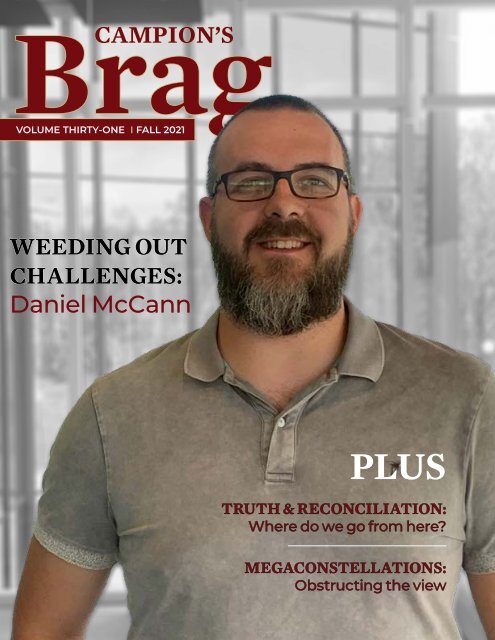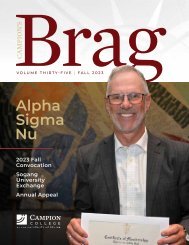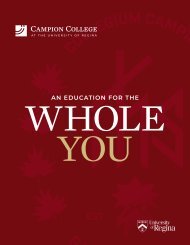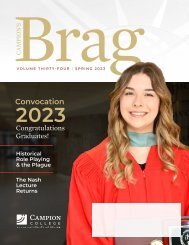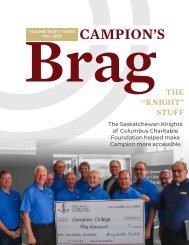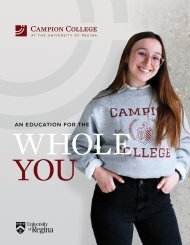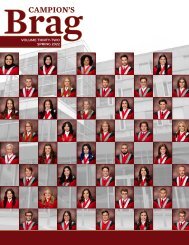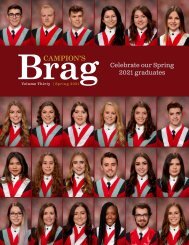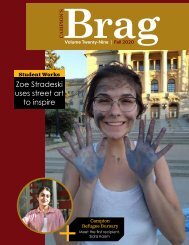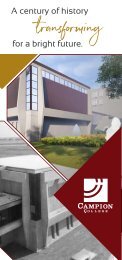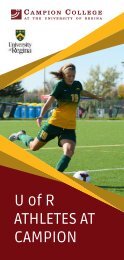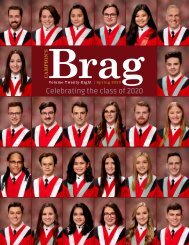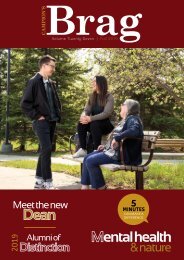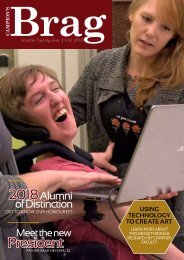Brag Fall 2021
You also want an ePaper? Increase the reach of your titles
YUMPU automatically turns print PDFs into web optimized ePapers that Google loves.
<strong>Brag</strong><br />
CAMPION’S<br />
VOLUME THIRTY-ONE І FALL <strong>2021</strong><br />
WEEDING OUT<br />
CHALLENGES:<br />
Daniel McCann<br />
PLUS<br />
TRUTH & RECONCILIATION:<br />
Where do we go from here?<br />
MEGACONSTELLATIONS:<br />
Obstructing the view
Editor:<br />
Shannon J. Kotylak<br />
Photography:<br />
Cover: Mark Wileniec<br />
Jesuits of Canada archive<br />
Jose Argerami<br />
Mike Muma<br />
U of R Photography<br />
Contributors:<br />
Fr. Jeffrey S. Burwell, SJ<br />
Krista Calfat<br />
Sara Degenstein<br />
Holly Gustafson<br />
Fr. Sami Helewa, SJ<br />
Megan Kasdorf<br />
Samantha Lawler<br />
Fr. Scott Lewis, SJ<br />
Alex MacDonald<br />
Dwayne Meisner<br />
Skye Mercier<br />
Leah Perreault<br />
Tom Phenix<br />
Dan Sherven<br />
David Silverberg<br />
All letters and submissions<br />
are welcome; however, we<br />
reserve the right to edit for<br />
clarity and length. Send<br />
submissions to:<br />
campion.college@uregina.<br />
ca or<br />
Campion College<br />
University of Regina<br />
3737 Wascana Parkway<br />
Regina, SK S4S 0A2<br />
Canada Post Agreement<br />
#40068928<br />
Campion’s <strong>Brag</strong> is<br />
published by Campion<br />
College at the<br />
University of Regina.
Photo: Mike Muma
WORDS FROM THE<br />
President<br />
The Campion Feast Day on December 1st is<br />
a liturgical event that makes us in contact<br />
with a Jesuit scholar from the past who<br />
is currently a saint. There is a lot to reflect on St.<br />
Edmund Campion but one of his unfamiliar quotes<br />
sticks to me the most and remains relevant to our<br />
time, “Between optimism and pessimism, there is<br />
confidence in God”.<br />
Campion the thinker-saint remains with us in his<br />
dual role of seeking the truth in scholarship while<br />
inspiring us with faith that did not deter him from<br />
martyrdom. How did he face such a death and<br />
what can this saint teach us today?<br />
The pandemic claims martyrs in our time and<br />
challenges the world with its illness. We feel<br />
humbled with our limitations to face alone the<br />
COVID-19 and its variants, we are encouraged<br />
by the collaboration we seek and today we<br />
are challenged to trust and give our sincere<br />
confidence in a God of healing who is laboring<br />
in our midst. Campion’s lesson liberates our<br />
imagination to supersede fear of the pandemic by<br />
pragmatic confidence in someone larger than us<br />
and our context. It is time to study confidence in the<br />
goodness we seek through faith and reason.<br />
Fr. Sami Helewa, SJ<br />
Photo: UofR Photography<br />
Watch Fr. Helewa’s words to the <strong>Fall</strong> <strong>2021</strong><br />
graduates on our YouTube channel.
CONTENTS<br />
6<br />
Campion’s <strong>Fall</strong> <strong>2021</strong><br />
graduates<br />
28<br />
2022 Alumni of Distinction<br />
Awards<br />
8<br />
Welcome to our new<br />
faculty and staff<br />
30 Megaconstellations:<br />
Blocking Out The Stars<br />
10<br />
Weeding Out Challenges:<br />
Daniel McCann<br />
32<br />
Meditation, Mysticism, And<br />
The Catholic Tradition<br />
12<br />
The Martin Kovacs<br />
Scholarship Fund:<br />
A Legacy From The Heart<br />
34<br />
Truth & Reconciliation:<br />
Where do we go from here?<br />
14<br />
Popular Music & The<br />
Modernist Dystopia<br />
38<br />
Moving Forward Doing<br />
What You Can<br />
16<br />
The Feast Of St. Edmund<br />
Campion<br />
40<br />
Academic Notes & Great<br />
New Campion Classes<br />
18<br />
Learning Latin Is Like<br />
Playing A Video Game<br />
42<br />
<strong>Brag</strong>-a-bits & Alumni<br />
Advertising<br />
20<br />
Jesuit Journey: A pilgrimage<br />
from Honolulu to Regina<br />
44<br />
Student Works: Exploring<br />
student creativity<br />
22<br />
Campion’s Annual Appeal:<br />
We need your help!<br />
47<br />
Campion Flashback:<br />
Pictures from the archives<br />
26<br />
Thank You 2020-21<br />
Donors
CLASS OF FALL <strong>2021</strong><br />
Taylor Theresa Marie Adolph<br />
BACHELOR OF ARTS<br />
Psychology (Linguistics)<br />
International<br />
Arslan Azeem<br />
CERTIFICATE IN ECONOMICS<br />
Arslan Azeem<br />
CERTIFICATE IN LAW & SOCIETY<br />
James Kenneth Falconer<br />
BACHELOR OF ARTS<br />
Psychology<br />
Anthony Michael Greif<br />
BACHELOR OF ARTS<br />
Psychology<br />
Jacqueline May Marie Guenette<br />
BACHELOR OF ARTS<br />
Political Science/Sociology (History)<br />
Distinction<br />
Cheyanne Rose Hill<br />
BACHELOR OF SCIENCE<br />
Psychology (Biology)<br />
Ashley Marie Howard<br />
BACHELOR OF ARTS<br />
Geography<br />
Ashley Marie Howard<br />
CERTIFICATE IN SPANISH<br />
Mieesha Tia Margaret Luzny<br />
BACHELOR OF ARTS<br />
Psychology (Sociology / Women’s and<br />
Gender Studies)<br />
Bojana Malinovic<br />
BACHELOR OF HEALTH STUDIES<br />
Health Studies (Psychology)<br />
Kristian A. McCullough<br />
BACHELOR OF ARTS<br />
Economics<br />
Stefano Mezzini<br />
BACHELOR OF SCIENCE<br />
Statistics<br />
Great Distinction<br />
Madeleine Elizabeth O’Connor<br />
BACHELOR OF ARTS HONOURS<br />
Economics<br />
High Honours in First Major<br />
Brian Peter Palaschuk<br />
BACHELOR OF ARTS<br />
English (Economics)<br />
Distinction<br />
Malina Damyanti Ram<br />
BACHELOR OF ARTS HONOURS<br />
Psychology<br />
Honours in First Major<br />
Tessa Kay Eugena Della Rehaluk<br />
BACHELOR OF ARTS<br />
Psychology/ Sociology<br />
Amanda Ubaruta<br />
BACHELOR OF SCIENCE<br />
Environmental Geoscience<br />
Amanda Ubaruta<br />
CERTIFICATE IN ECONOMICS<br />
6
WORDS FROM THE<br />
Dean<br />
To all of our graduating students of <strong>2021</strong> -<br />
congratulations!<br />
The road to this day has not been easy. You have<br />
had to adapt to a dramatically different educational<br />
landscape. The scope of these changes can be<br />
accurately characterized as ‘revolutionary’. You left<br />
behind paper and pencil exams and started writing<br />
exams online. Instead of meeting peers and faculty<br />
in classrooms and hallways, meetings were taking<br />
place on computers. You adapted to a new learning<br />
environment and contended with numerous and<br />
novel stressors produced by the COVID-19 virus. To<br />
face these substantial obstacles ― and successfully<br />
overcome them ― speaks loudly to your strength and<br />
capability. You are ready to face the challenges of<br />
our world in order to help transform it for the better.<br />
I would also like to recognize the support provided<br />
by family and friends. Our graduates relied on you to<br />
help them through difficult times. Thank you for being<br />
there when they needed you!<br />
To our graduates: you are ready to move on to the<br />
next phase of your life, whether it’s starting your<br />
career or pursuing further professional or scholarly<br />
endeavors. As we move towards better days,<br />
our province and country will need the values,<br />
knowledge, skills, and wisdom you have cultivated.<br />
Know that wherever you go, Campion College will<br />
always be your home! As Dean of Campion College,<br />
I want to express how proud and grateful I am to you<br />
for deciding to take this journey with us.<br />
Dr. Tom Phenix<br />
Watch Dr. Phenix’s words to the <strong>Fall</strong> <strong>2021</strong><br />
graduates on our YouTube channel.<br />
Photo: UofR Photography
HELLO!<br />
JOSE ARGERAMI<br />
Communications Coordinator<br />
HOW I GOT HERE: At the end of my second year, I<br />
became the part-time student assistant in Communications.<br />
I did the position for almost two years and when the<br />
Communications Coordinator position opened up around<br />
the same time I graduated, they offered it to me!<br />
FIRST IMPRESSION OF CAMPION: I used to come to<br />
daily mass with my mom sometimes when I was little and so<br />
it was already familiar when I started coming as a student.<br />
Campion has always felt “warm” to me.<br />
FAVOURITE SAYING: “The Lord loves” when something<br />
good happens<br />
WHAT DO YOU DO FOR FUN? Spend time with friends<br />
and family!<br />
DR. DWAYNE MEISNER<br />
Instructor, Classics<br />
HOW I GOT HERE: I started as a Sessional in 2015 and<br />
have been teaching at Campion since then.<br />
FIRST IMPRESSION OF CAMPION: “These<br />
auditorium seats are so comfortable!”<br />
FAVOURITE SAYING: “I will sing to those who know; noninitiates,<br />
shut the door!” (Orphic Fragment 1)<br />
WHAT DO YOU DO FOR FUN? I take care of my son,<br />
video games, and movies.<br />
8
Welcoming the new<br />
faces at Campion<br />
DR. SCOTT LEWIS, SJ<br />
Lecturer, Catholic Studies<br />
HOW I GOT HERE: Last year, I became associate professor<br />
emeritus at Regis College in Toronto after almost 25 years of<br />
teaching New Testament. I was hoping for a change of scene<br />
and a place to both teach and do pastoral work. I visited<br />
Regina for three weeks in the summer of 2020 to help out in<br />
some parishes and had the opportunity to visit Campion. I<br />
knew that it was where I was supposed to be.<br />
FIRST IMPRESSION OF CAMPION: Even with the<br />
limitations imposed by COVID, it has made a good impression<br />
on me. The faculty and staff have been most welcoming.<br />
FAVOURITE SAYING: “Bidden or unbidden, God will be<br />
present.”<br />
WHAT DO YOU DO FOR FUN? Reading, music, walking.<br />
DR. SUSAN YAMAMOTO<br />
Assistant Professor, Psychology<br />
HOW I GOT HERE: My mentor graduated from Campion,<br />
so I think it was meant to be!<br />
FIRST IMPRESSION OF CAMPION: I felt like I had found<br />
my people.<br />
FAVOURITE SAYING: “I’m going on an adventure!” – Bilbo<br />
Baggins<br />
WHAT DO YOU DO FOR FUN? I love video games and<br />
am a bit of a Trekkie.<br />
9
By David Silverberg<br />
WEEDING OUT<br />
CHALLENGES:<br />
Daniel McCann<br />
He’s taking drones into the fields to<br />
revolutionize crop farming.<br />
For Daniel McCann (BSc ’05), life has come full<br />
crop circle: growing up in Regina, his family<br />
helped run a farm but he was too busy on his<br />
computer to fuss around with watering, pulling out<br />
weeds, tending the land... he had programming<br />
languages to learn.<br />
Now, he’s leveraging his technology acumen as<br />
the founder of a startup focused on agriculture<br />
technology, or AgTech, as it’s commonly known.<br />
Precision AI, also based in Regina, is an AI and<br />
robotics company that is seeking to support<br />
sustainable farming practices with computer vision<br />
tools housed in drones.<br />
What McCann wants to<br />
accomplish is nothing short of a<br />
game-changer for farmers: to<br />
enable drones to spray herbicide<br />
and pesticides only on weeds and<br />
to avoid crops ― a practice that<br />
can produce yields at a fraction<br />
of the chemical cost. Also, such<br />
surgical targeting can ensure<br />
those harmful chemicals don’t<br />
end up on the crops that we end<br />
up eating.
Precision AI technology will roll out on<br />
a limited basis beginning in 2022 in<br />
Saskatchewan, said McCann. “Farmers<br />
need autonomous machines that can<br />
serve these fields on a plant-by-plant basis,<br />
and farming is largely inefficient now,”<br />
he volunteered. He noted how common<br />
methods for herbicide spraying can lead<br />
to 80 percent wasted on the ground,<br />
while Precision AI’s own strategy forecasts<br />
reducing pesticide use by up to 95 percent.<br />
That reduction is drastically needed,<br />
especially for farmers’ health: a 2020<br />
study found that 44 percent of farmers,<br />
farmworkers, and pesticide applicators<br />
around the world face at least one incident<br />
of acute pesticide poisoning on the job<br />
every year, and 11,000 die annually from<br />
accidental pesticide poisoning.<br />
McCann pointed out that drones armed<br />
with computer vision tech are ideal sprayers<br />
because they were “fed” two billion images<br />
to help them instantly determine if what<br />
they’re surveying is a weed or crop. He<br />
explained, “We had to teach them that<br />
many images because the same crop can<br />
look very different if it was planted in, say,<br />
sandier soil compared to soil that gets lots of<br />
rain and sun.”<br />
But how did a farm kid from Regina come<br />
to leading the charge with that kind of<br />
innovation? It started when the teen<br />
coder enrolled at Campion College at the<br />
University of Regina.<br />
During his time at Campion, McCann<br />
credited the school’s top-notch education<br />
and welcoming atmosphere for motivating<br />
him during his years studying computer<br />
science. “At Campion, I never felt like I was<br />
just a number, like at other larger campuses,”<br />
he remembered.<br />
He also tells stories about playing basketball<br />
at Campion with other hoop-loving<br />
professors. “Sometimes, we would play 1-on-<br />
1 full court,” he laughed.<br />
Precision AI testing out their drone technology<br />
When it came time to embark on his tech<br />
career, he spent time at firms such as<br />
NetSecure Technologies and Anywhere<br />
Commerce, but running his own startup was<br />
a siren song he couldn’t resist for any longer.<br />
When he worked at other tech companies,<br />
McCann was neck-deep in code and<br />
software, but transitioning to a CEO,<br />
he needed to learn leadership skills to<br />
strengthen the entire company. He effused,<br />
“With Precision AI, I want to get the best out<br />
of the people who work for us, and to make<br />
sure we have enough capital to fund what<br />
we have to do going forward.”<br />
With $20 million in seed equity capital and<br />
grant funding secured in May <strong>2021</strong>, Precision<br />
AI is on its way to becoming a major player<br />
in AgTech. It’s a vision McCann is determined<br />
to make a reality.<br />
He concluded, “We have the ability to<br />
dramatically reduce chemical use on a<br />
global basis and make food healthier and<br />
save farmers money and that’s what gets<br />
me excited to get out of bed every morning.”<br />
11
By Holly Gustafson<br />
BA’96<br />
THE MARTIN KOVACS<br />
SCHOLARSHIP FUND:<br />
A LEGACY FROM THE HEART<br />
But according to Leah Quick, an EAL<br />
instructor at Luther College who has<br />
had the privilege of working with the<br />
Hungarian students throughout the<br />
summer, the gift from the Kovacs is<br />
much more than a scholarship – it’s a<br />
legacy from the heart.<br />
Mrs. Anna Kovacs<br />
The Martin Kovacs Scholarship<br />
Fund was established through<br />
Campion and Luther College<br />
in 2001 by Mrs. Anna Kovacs in<br />
memory of her husband Dr. Martin<br />
Kovacs, who passed away in 2000;<br />
the scholarship program sponsors<br />
Grade 11 and 12 students from<br />
Hungary each summer to come<br />
to Regina, receive academic<br />
instruction, improve their English<br />
language skills, and experience local<br />
Canadian culture.<br />
The Kovacs were born in western<br />
Hungary, but shortly after their<br />
marriage in 1944, they were forced to<br />
flee their home country. After living<br />
in Europe and Australia, the couple<br />
made their home in Regina, where<br />
Dr. Kovacs was a professor of history<br />
at the University of Regina. Losing<br />
an infant early in their marriage, the<br />
Kovacs never went on to have more<br />
children, but for Mrs. Kovacs, the<br />
students who came from Hungary<br />
through the scholarship program<br />
were like her own.<br />
Two of Mrs. Kovacs’ “children” are<br />
Emese Orban, from Budapest, and<br />
Boti Boldizsar, who comes from a<br />
small village called Tordas. Emese<br />
and Boti arrived in Canada in July of<br />
2018, having only met once before<br />
12
in Hungary a few weeks before the<br />
program began, but as the summer<br />
progressed, so did their friendship.<br />
By the end of the summer, they<br />
were dating, and in March of this<br />
year, Emese and Boti got engaged.<br />
Currently the couple is living in<br />
Budapest while Emese completes<br />
her final year of a business degree at<br />
Corvinus University of Budapest; they<br />
plan to get married in April of 2022.<br />
And they are incredibly grateful<br />
for the opportunity provided by<br />
the generosity of the Kovacs.<br />
“To describe the time we spent<br />
in Canada in one word: it was<br />
amazing,” say Emese and Boti. “We<br />
are so thankful – it turned out to be<br />
a life-changing summer that we will<br />
never forget.”<br />
The Hungary program has been<br />
suspended since 2020, but Leah<br />
hopes that it will back up and running<br />
by the summer of 2023.<br />
“For Mrs. Kovacs, this was so much<br />
more than a program; this was a<br />
significant part of her life’s work. It’s<br />
her legacy, a project from the heart,<br />
borne from a life of service, a life lived<br />
to serve.”<br />
Pictures from their summer in Regina in 2018<br />
Emese & Boti<br />
13
By Alex MacDonald<br />
Associate Professor, English<br />
POPULAR MUSIC &<br />
THE MODERNIST<br />
DYSTOPIA<br />
Campion’s Dr. Alex MacDonald explored musical references<br />
in Nineteen Eighty-Four and Brave New World.<br />
14
This started off as a Friday afternoon talk<br />
(with snacks) in the Campion “Idle Talk”<br />
series of faculty lectures. The subject was<br />
music and song references in George Orwell’s<br />
Nineteen Eighty-Four and it seemed to be well<br />
received. When I took the talk to the University<br />
of Saskatchewan (as part of the annual<br />
exchange of speakers between the English<br />
departments) I added in Aldous Huxley’s Brave<br />
New World. For both talks, I brought along my<br />
keyboard and offered demonstrations of some<br />
of the pieces.<br />
The musical references in Brave New World and<br />
Nineteen Eighty-Four are primarily to popular<br />
songs of the 1920s and 1940s.<br />
Huxley underscored the emotional shallowness<br />
of popular music, represented by such<br />
immortal songs as “Hug Me Till You Drug Me,<br />
Honey.” Brave New World’s scorn for popular<br />
music ― and for popular culture in general ―<br />
situates Huxley’s famous dystopia as a “High<br />
Modernist” work.<br />
In Orwell’s case, implicit references to World<br />
War II hits such as “We’ll Meet Again” and “I’ll<br />
Be Seeing You” reflect ironically upon the<br />
relationship of Winston and Julia and their<br />
terrible situation at the end of the novel.<br />
Orwell’s treatment of the musical thrush and<br />
the singing Prole laundrywoman plays a more<br />
hopeful note, and shows a more positive<br />
attitude to popular songs and popular culture,<br />
which situates Nineteen Eighty-Four on the<br />
cusp of “Post-Modernism.”<br />
There has been considerable scholarly<br />
discussion about hope and despair in<br />
these famous dystopian novels. The signs of<br />
hopefulness in Brave New World are very<br />
slight, although they do exist. However, music<br />
references in Nineteen Eighty-Four lend some<br />
support to the view that Orwell’s novel is not<br />
quite so despairing as it is sometimes made out<br />
to be.<br />
Scholarly projects often turn up interesting<br />
details along the way. One detail about Brave<br />
New World that I had never really considered<br />
has to do with the lighthouse to which John<br />
escapes at the end of the novel. I assumed, in<br />
my geographical ignorance, that this was a<br />
lighthouse on the seacoast somewhere. When<br />
I realized that Surrey is a county near London<br />
which has no seacoast, it became clear this<br />
was an inland lighthouse. Huxley’s childhood<br />
home was near an abandoned Victorian<br />
semaphore tower and his imagination<br />
converted this into a lighthouse for the<br />
guidance of the brave new world’s helicopter<br />
pilots.<br />
Another curious detail arose from Orwell’s<br />
allusion to a popular novelty song of 1939:<br />
“Under the Spreading Chestnut Tree.” It is a<br />
sentimental love song based on a poem by<br />
Longfellow, and Orwell used it ironically as the<br />
name for the “Chestnut Tree Café” in the novel,<br />
associated with the fact that Winston and Julia<br />
have betrayed each other. The sheet music<br />
also contains drawings of stick-figures above<br />
the notes, showing how to do the dance steps<br />
to the song.<br />
Scholarship since the 1960s has paid<br />
considerable attention to the cultural contexts<br />
of literature, including songs and the internet<br />
makes it relatively easy to access song allusions.<br />
For example, Orwell’s ironic allusion of “We’ll<br />
Meet Again” becomes even more meaningful<br />
when we see and hear Vera Lynn performing<br />
the song for hundreds of troops about to ship<br />
off to war.<br />
Consider adding some music to your reading -<br />
it may make the words come alive!<br />
LEARN<br />
MORE<br />
You can read Dr.<br />
MacDonald’s article<br />
in the University of<br />
Toronto Quarterly,<br />
Volume 90, Issue 1:<br />
15
By Dwayne Meisner<br />
Instructor, Classics<br />
LEARNING LATIN IS LIKE<br />
PLAYING A<br />
VIDEO GAME<br />
Dr. Dwayne Meisner is taking a unique approach to<br />
teaching students the language.<br />
It all started as a simple analogy.<br />
When I began teaching Latin in 2013,<br />
I told my students that learning<br />
a new language is like playing a<br />
video game. At first it’s very simple, sort of<br />
like how at the start of a video game it’s very<br />
easy. But then as you go further in the game,<br />
the monsters become more powerful, but so<br />
does your character. In the same way, as you<br />
go forward in a language course, it becomes<br />
more difficult and complex, but at the same<br />
time your ability to translate improves.<br />
When I began teaching Latin at Campion,<br />
I took this analogy further by actually<br />
structuring the assignments and quizzes like<br />
a role-playing game. I have friends who play<br />
Dungeons and Dragons, and I have played<br />
numerous Final Fantasy games, so I structured<br />
the assignments based on these models. The<br />
way role-playing games work is that someone<br />
plays the main character of an epic story,<br />
getting into fights with monsters along the<br />
way. Each monster the character defeats is<br />
worth a certain number of experience points,<br />
and after earning a sufficient number of<br />
experience points, the character gains a level<br />
and becomes more powerful, with the goal of<br />
becoming as powerful as possible before the<br />
end of the game.<br />
I have made this work in a Latin course by a<br />
system of weekly Latin Quests. Every week<br />
students do either an assignment and/or<br />
quiz, but instead of taking marks off for wrong<br />
answers, students earn Latin Points (LP) for<br />
correct answers. Each word is worth a certain<br />
number of LP, the same way that a monster in<br />
a role-playing game is worth a certain number<br />
of experience points. Once students have<br />
earned enough LP by correctly translating<br />
Latin words, they level up, and each level<br />
corresponds to 1% of the final grade. These<br />
weekly Latin Quests (a title suggested by<br />
students) add up to 40% of the final grade,<br />
so the goal is to get as close to Level 40 as<br />
possible.<br />
What this looks like is made clear in the first<br />
week’s Latin Quests. It takes 100 LP to get to<br />
Level 1 and another 100 LP to get to Level 2.<br />
16
Students write a take-home assignment<br />
with 10 questions, each worth 10 LP, and<br />
a quiz with 10 questions, each worth<br />
10 LP. If they earn 90 LP in each, the total<br />
points earned is 180 LP, so they level up<br />
to Level 1. The next week, they only need<br />
another 20 LP to get to Level 2. It gets more<br />
complicated from there, as they learn<br />
more of the language and each level<br />
requires more LP.<br />
Structuring Latin assignments in this way<br />
has both pedagogical and entertainment<br />
value. It allows for absolute precision and<br />
objectivity, and students have found it<br />
more rewarding to earn points and levels<br />
as rewards for correct answers than to lose<br />
marks as penalties for wrong answers. It<br />
also makes learning more fun. This system<br />
has been successful with students year<br />
after year, especially with gamers, to the<br />
extent that now we refer to midterms as<br />
boss fights, and the final exam as the big<br />
boss at the end of the game.<br />
When the COVID-19 pandemic began,<br />
like many other courses, first-year Latin<br />
had to be taught remotely. But despite the<br />
challenges of trying to teach a language<br />
course without face-to-face interaction in<br />
the classroom, it has gone remarkably well<br />
because now the Latin course literally is a<br />
video game.<br />
17
On December first,<br />
we celebrate our<br />
College’s patron<br />
saint, Edmund Campion.<br />
Interestingly, his story has<br />
resonance for those living in<br />
today’s complex world.<br />
Although he was born in<br />
1540 to an English family, his<br />
life and upbringing reflect<br />
many of the same challenges<br />
that students in small-town<br />
Saskatchewan face today.<br />
He grew up during a period<br />
in which theological and<br />
political ideologies were<br />
dividing people in altogether<br />
unprecedented ways. Sound<br />
familiar?<br />
The people of England<br />
were starting shirk their<br />
long Catholic history and<br />
adopt the Protestant<br />
values advocated by<br />
the royal monarchy.<br />
Individuals,<br />
families,<br />
and entire communities<br />
found themselves arguing<br />
against each other with<br />
each asserting their<br />
own perspectives as<br />
uncompromisingly true.<br />
IMAGE COURTESY OF THE JESUITS<br />
OF CANADA ARCHIVES<br />
Despite the complexities<br />
that swirled around him,<br />
Campion approached the<br />
competing worldviews with<br />
intellectual rigor. Initially<br />
ordained in 1564 as a Deacon<br />
in the Church of England,<br />
his constant openness to<br />
different perspectives began<br />
18
By Fr. Jeffrey S. Burwell, SJ<br />
Director of Catholic Studies<br />
DECEMBER FIRST IS...<br />
THE FEAST OF<br />
ST. EDMUND CAMPION<br />
to lead him toward the Roman Catholic<br />
Church. At this time in history, it was illegal to<br />
be a Catholic priest in the country, and he<br />
knew much would be lost if he embraced<br />
Catholicism.<br />
Nevertheless, solid intellectual reasoning<br />
finally convinced him to leave his Anglican<br />
tradition and become Catholic as a priest of<br />
the Society of Jesus. Going to Rome in 1573<br />
in order to enter the Jesuits, he was ordained<br />
and celebrated his first mass on September 8,<br />
1578.<br />
Campion knew that England would never<br />
accept him as a Catholic priest, and – despite<br />
knowing the dangers – he obeyed his Jesuit<br />
superiors when they sent him back to minister<br />
to Catholics in the largely Anglican nation. In<br />
time, as was expected, he was arrested for<br />
the role he played in promoting the Catholic<br />
faith. Proclaiming the truth of his convictions<br />
until the very end, Campion maintained that<br />
the enterprise of evangelization would not be<br />
stopped on English soil; he was tortured and<br />
killed on December 1, 1581 at 41 years of age.<br />
Today, much like in the time of Edmund<br />
Campion, we know our students are<br />
bombarded with information that can<br />
be confusing and – very often – quite<br />
contradictory. It is the mandate of both<br />
faculty and staff at our college to ensure that<br />
students do not hold uneducated opinions;<br />
we encourage them to be bold when it<br />
comes to exploring other options.<br />
Secular and religious society is becoming<br />
increasingly divided, and larger numbers of<br />
individuals are entrenching themselves in<br />
rigid perspectives. We encourage each of<br />
our students – past and present – to embrace<br />
Campion’s model of intellectual enquiry;<br />
they are invited continually to explore all<br />
perspectives without bias or fear. Although<br />
the world seems to demand that we pick a<br />
perspective now and hold on to it tightly, we<br />
know the search for truth takes time and it<br />
means holding all things in tension.<br />
There were no easy answers in the age of<br />
Edmund Campion and the same is true<br />
for students of the college that bears his<br />
name. All the same, we look to our patron<br />
saint’s example of courage; we pray that our<br />
students never make the easy decisions in life<br />
but always be willing to risk it all for the right<br />
decisions.<br />
19
By Fr. Scott Lewis, SJ<br />
Lecturer, Catholic Studies<br />
JESUIT<br />
JOURNEY<br />
A pilgrimage from Honolulu to Regina.<br />
Change and movement have<br />
always been part of my life. I<br />
was born in Honolulu, Hawaii<br />
but because by father was in the<br />
military, we often moved around<br />
from place to place. He retired from<br />
the military when I was 11 and we<br />
returned to the islands.<br />
Growing up in a multi-cultural<br />
environment was an enriching<br />
experience and it has helped me to<br />
be adaptable in new environments<br />
and to appreciate diversity. After<br />
high school, I joined the US Navy and<br />
served for 8 years. I was stationed in<br />
many places – the most interesting<br />
was three years in Japan as a<br />
technical advisor to the Japanese<br />
Navy. I left when I was 25 and began<br />
studies at the University of Hawaii,<br />
which was a transformative event in<br />
my life.<br />
Besides developing a near obsession<br />
with history and the Bible, I began a<br />
spiritual journey and was received into<br />
the Catholic Church. After graduate<br />
studies at the Catholic University of<br />
America, I entered the Society of<br />
Jesus in 1979, and was ordained in<br />
1987. My studies and apostolic work<br />
took me to New York, Phoenix, and<br />
Boston, and after ordination, to<br />
Rome for post-graduate studies at<br />
the Pontifical Biblical Institute and the<br />
Gregorian University.<br />
Rome was a wonderful opportunity to<br />
experience the universal church and<br />
to encounter students from all over<br />
the world. After eight years in Rome, I<br />
was transferred to Jerusalem, and my<br />
stay there had a strong impact on my<br />
thinking.<br />
20
Jerusalem was a city obsessed with<br />
religion but tainted with intolerance<br />
and hatred and no faith tradition<br />
was innocent. Bus bombings were<br />
regular occurrences. But I also<br />
became aware of the profound<br />
injustices that fueled such violence.<br />
This Jerusalem sojourn changed<br />
the way I read, interpret, teach, and<br />
preach Scripture.<br />
I have returned several times over<br />
the years to teach courses and<br />
lead groups. In 1997, a ‘chance’<br />
encounter with Archbishop Terry<br />
Prendergast led to a job at Regis<br />
College, part of the Toronto School<br />
of Theology. I intended to move<br />
on after a couple of years, but the<br />
‘couple’ became almost 25. During<br />
that time, I became a Canadian<br />
citizen.<br />
My responsibilities were varied: In<br />
addition to teaching, I served a fiveyear<br />
term as Dean of the college<br />
and was Director of the Manresa<br />
Jesuit Spiritual Renewal Centre in<br />
Pickering for five years.<br />
My New Testament specialties are<br />
the Pauline letters and the Gospel of<br />
John. My particular interests focus on<br />
religious violence and the fostering<br />
of interpretations of Scripture that are<br />
healthy and life-giving.<br />
I emphasize the application of<br />
Scripture to everyday life and the<br />
problems facing our world. It took<br />
many years to travel from Honolulu to<br />
Regina, with many stops in between.<br />
Each stop has presented challenges,<br />
blessings, and opportunities for<br />
intellectual and spiritual growth.<br />
Regina and Campion College will<br />
not disappoint.<br />
21
CAMPION’S<br />
ANNUAL<br />
PPEAL<br />
CHAPEL RENOVATIONS &<br />
STUDENT SCHOLARSHIPS<br />
22
I hope that you and your loved ones have remained safe and healthy this past year<br />
as this pandemic continues to affect our everyday lives.<br />
We have been very busy at Campion, completing the smart classroom upgrades<br />
and air handling renovations thanks to your generosity. As the urgent mechanical<br />
needs have been addressed for our building, it is time for us to look to upgrading<br />
our beloved chapel space. Since Campion College was built in the late 1960s, the<br />
chapel has been a beacon of peace and unity on our campus but it is starting to<br />
show its age. There is great potential for the space to be transformed both inside<br />
and out to continue to be a symbol of hope and unity for both our College and the<br />
entire university campus.<br />
Our Jesuit values have always been the essence of Campion. This past year has<br />
highlighted one in particular - Cura Personalis or care for the whole person. Even<br />
at a distance, our students regularly share with us happiness in their successes and<br />
distress in their struggles, mentally, physically, and financially.<br />
Student life has become very difficult and the financial worries are significant. We<br />
have seen a record number of applications for scholarships. Meanwhile, financial<br />
difficulties have been cited as the number one reason students are dropping out of<br />
university. As they are facing the uncertainty of an unknown future, their education<br />
will be a valuable commodity to bring them hope.<br />
In short, our students and our College need your help now.<br />
Please support our scholarship funds and chapel project. With your help, we can<br />
discern the path forward to create a bright future for our youth while ensuring<br />
Campion can educate future generations in the Jesuit tradition.<br />
If you have other ideas to help, reach out to Krista Calfat in Donor Relations at<br />
krista.calfat@uregina.ca.<br />
Thank you and may God bless you.<br />
Fr. Sami Helewa, SJ<br />
President<br />
PS: Your generosity is a formative force for our students. It will allow us to continue<br />
to strive to educate men and women for others, shaping them to be the leaders our<br />
world needs during these troubled times.<br />
23
Building<br />
Updates<br />
Throughout the pandemic, we have<br />
undertaken both minor and major<br />
renovations to our beloved building.<br />
From upgrading to smart classrooms to the new<br />
ductwork and air purification and handling units,<br />
we have been working to ensure we can reunite<br />
safely and comfortably in the near future.<br />
Our chapel has always been a space that is vital<br />
and important to our students and community<br />
but the wear is beginning to show. We want to<br />
enhance the beauty of it, both inside and out so it<br />
will be a focal point of our College and the entire<br />
University of Regina campus for many years to<br />
come!<br />
The costs have been significant so far, and we are<br />
looking for your help as we continue to do these<br />
vital upgrades.
Student<br />
Supports<br />
How to<br />
Donate<br />
The number one reason we’ve heard<br />
for students discontinuing their<br />
education in the past year is because<br />
of financial difficulties.<br />
Many of the jobs affected by the pandemic<br />
were in industries where our students work<br />
both during the year and over the summer.<br />
With less jobs and opportunities, their<br />
pocketbooks have taken a serious hit.<br />
As we have seen record numbers of<br />
applicants for both our entrance and<br />
continuing scholarships, we know our<br />
students need your support.<br />
The generosity you show today has a lasting<br />
impact on our students which they will<br />
remember throughout their lives.<br />
Online<br />
Quickly make your donation or set<br />
up monthly payments with our<br />
secure system:<br />
campioncollege.ca/support-campion<br />
Mail<br />
Use our enclosed donation card<br />
sent to the address on the back.<br />
Phone<br />
Give us a call at 306.586.4242 or<br />
1.800.667.7282.<br />
Email<br />
Contact Krista Calfat, Alumni &<br />
Development Officer at<br />
krista.calfat@uregina.ca
THANK YOU<br />
• Anthony Abello<br />
• Rev. Louis Abello<br />
• Jane Akpan<br />
• Alpha Sigma Nu<br />
• Archiepiscopal Corporation of Regina<br />
• James & Eileen Barks<br />
• Vincent & Hilde Beckie<br />
• Mr. & Mrs. Walter Bellegarde<br />
• Julius & Barbara Biegler<br />
• John & Cecilia Biss<br />
• William Borbely<br />
• Irene Boss<br />
• J. Paul & Elaine Bourassa<br />
• Robert & Jane Braun<br />
• Wendy & Fran Brunelle<br />
• Maurice Bundon & Michelle Carr<br />
• Carla Burton<br />
• Fr. Jeffrey Burwell, SJ<br />
• Anne Campbell<br />
• Jan Campbell<br />
• Angela Carnall<br />
• Rita Carriere<br />
• Catholic Women’s League - Christ The King Parish<br />
• Catholic Women’s League - Holy Cross Parish<br />
• Catholic Women’s League - Holy Family Parish<br />
• Shannon Chapple<br />
• Dr. Kelly Christopherson<br />
• Daniel Coderre<br />
• Rob & Ingrid Currie<br />
• Dr. Gene Dagnone<br />
• Joe & Magdalen Dang<br />
• Elizabeth Danowski<br />
• Renee De Moissac<br />
• Jerry Deshaye<br />
• Linda & Rob Dewhirst<br />
• Timothy Diewold<br />
• Charles Dixon<br />
• Very Rev. Anthony Dizy<br />
• Richard Domokos<br />
• Jim and Michele Braun<br />
• Laura & Charles Dubois<br />
• Rose Eberle<br />
• Ronald Eistetter<br />
• Sandi Ellert Day & Ryan Day<br />
• Dawn & Bill Elliott<br />
• Richard Emond<br />
• Dr. Allison Fizzard<br />
• Frank & Sandra Flegel<br />
• Patricia Fleming<br />
• Paul Flynn & Anita Flynn<br />
• Lawrence Forand<br />
• Harvey & Sylvia Fox<br />
• Robert Friedrich<br />
• Randy Garvey<br />
• Rose Marie & John Geiss<br />
• Gwen Gibney<br />
• Elaine Giroux-Sylvestre & Roger Sylvestre<br />
• Randy & Marlene Glettler<br />
• Lynn Goldman<br />
• Lorraine Gosselin & Marcel Magotiaux<br />
• Ben J. Grebinski<br />
• Dr. Franz Volker Greifenhagen & Susan Cherland<br />
• Dr. Leanne Groeneveld<br />
• Mr. & Mrs. Andrew Grzesina<br />
• Madam Justice Ellen Gunn<br />
• James & Holly Gustafson<br />
• Susan Haddad<br />
• Janaya Hanley<br />
• Ian & Anita Hanna<br />
• Paul Hartman & Martha McIntyre<br />
• John & JoAnne Hartney<br />
• Rose Mary Hartney<br />
• Terry & Kevin Harty<br />
• Dr. Sami Helewa, SJ<br />
• Myron & Helen Herasymuik<br />
• Herbert Herauf<br />
• Dr. Bryan Hillis & Dr. Joanne Hillis<br />
• George Hoffman<br />
• Ione & Richard Hooper<br />
• Lenore Huber<br />
• Dr. Warren Huber<br />
• Leonard Jelinski<br />
• Jesuit Fathers of Saskatchewan<br />
• Nadia Kazymyra<br />
• Dr. Donald Kent & Joyce Kent<br />
• Donna Kilarski & Barry Vall<br />
• Dr. Stephen King<br />
• Knights of Columbus #2031<br />
• Knights of Columbus #3360<br />
• Knights of Columbus #4280<br />
• Knights of Columbus #6182<br />
• Rev. Ken Koep<br />
• Gerry & Colleen Kot<br />
• Shannon Kotylak<br />
26
2020-21 DONORS<br />
• Ron & Yvonne Kruzeniski<br />
• Ronald Krystynak<br />
• Rev. Gary Kuntz<br />
• Dr. Robert Labbie<br />
• Liane Laville-Morse<br />
• Dr. Gordon Leboldus<br />
• Allen & Gail Lefebvre<br />
• Marlene & Lee Lefebvre<br />
• Don & Terry Leier<br />
• Brad & Justine Lulik<br />
• Emil & Debbie Lulik<br />
• Dr. Alex MacDonald<br />
• Jenny MacDonald<br />
• Daryl MacLeod & Barbara Prystai<br />
• Joanna H. Majkut<br />
• Honourable Ted & Penny Malone<br />
• Paul & Caitrin Malone<br />
• Richard Mantyak<br />
• Catherine Marr<br />
• Hildegard & Keith Martin<br />
• Dr. Philippe Mather & Angeline Chia<br />
• Gordon & Wendy Mayer<br />
• Barry McCashin<br />
• Douglas McCashin<br />
• Glen McDougall<br />
• Kenneth & Marcia McGovern<br />
• Doug McKillop<br />
• Dr. David Meban<br />
• Richard Meehan<br />
• Marlene & Edward Miller<br />
• Helen Molloy<br />
• Stephanie Molloy<br />
• Dr. Robert Moore<br />
• Michael Morris & Sandra Gagnon<br />
• Dr. Anna Mudde<br />
• Philip Mueller<br />
• Lucille & Orest Nawrocki<br />
• Rita Nell<br />
• Denise & Kelly Nelson<br />
• Patty Niebergall<br />
• Dr. John & Nicolette Niedermayer<br />
• Nicole O’Byrne<br />
• Fr. Frank Obrigewitsch, SJ<br />
• Del Ottenbreit<br />
• Frank & Maureen Ottenbreit<br />
• Beatrice Parker<br />
• Hudson Parkinson<br />
• Dr. Marc Patenaude<br />
• Judith Pellerin<br />
• Verda Petry<br />
• Dr. Tom Phenix<br />
• Dr. Robert Piercey<br />
• Annette Polasek<br />
• Lisa Polk<br />
• David & Leanna Prost<br />
• Dr. Gillian Ramsey<br />
• Regina Diocesan CWL<br />
• Pauline & Carl Reinelt<br />
• Theresa & Glenn Reinhart<br />
• Thomas & Barbara Rendall<br />
• James A. Richards<br />
• Joan M. Rink<br />
• Bob & Joan Roy<br />
• Saskatchewan Knights of Columbus Charitable<br />
Foundation<br />
• Darcia Schirr<br />
• Glenn Schwartz<br />
• Jim & Mary Seiferling<br />
• Barry Shefernack<br />
• Edward Shenher<br />
• Sisters of the Presentation of Mary<br />
• Dr. George Smadu & Dr. Marlene Smadu<br />
• South Saskatchewan Community Foundation<br />
• James Taylor<br />
• Lucille & Omer Tessier<br />
• The Canadian Jesuit Missions<br />
• Doug Thomas & MaryAnn Rooney<br />
• Mike & Patricia Thomas<br />
• United Way Of Regina<br />
• Valley Native Ministries<br />
• Koren Volk & Rick Dean<br />
• Dr. Maureen Volk<br />
• Greg Wagner<br />
• Paul Welsh & Mary Ann Zakreski<br />
• The Estate of Dr. White<br />
• J. Gordon Wicijowski<br />
• Danuta & Wladyslaw Wojcik<br />
• Ronald & Joanne Wormsbecker<br />
• Ken Yanko<br />
• Brian Yaworski Q.C.<br />
• Theresa & Bill Yee<br />
• Brian & Kathy Yurris<br />
• Lillian Zuck<br />
27
COMING BA<br />
ALUMNI OF<br />
Nominate a Campion graduate<br />
for our prestigious<br />
Alumni of Distinction award!<br />
We are cautiously excited to announce the return of the<br />
Campion College Alumni of Distinction awards in 2022 but<br />
we need your help! We hear anecdotal stories of the amazing<br />
things Campion alumni are doing in our community and now, we want<br />
to recognize them.<br />
Consider nominating an alumnus who distinguishes themselves within<br />
their chosen profession or through exceptional volunteer activity or<br />
humanitarian service.<br />
Nominees must demonstrate the key characteristics of a Jesuit<br />
education: striving for more (magis), care for the whole person (cura<br />
personalis), demonstrating leadership in service, and promoting justice<br />
in their professional and personal actions.<br />
For more information and the nomination form,<br />
go to campioncollege.ca/alumni. If you have any<br />
questions, reach out to Krista Calfat, Alumni and<br />
Development at krista.calfat@uregina.ca or<br />
306-586-4242.<br />
28
CK IN 2022:<br />
DISTINCTION<br />
2022 Awards Gala<br />
Thursday, May 12, 2022<br />
Tickets on sale in the new year at campioncollege.ca
By Samantha Lawler<br />
Assistant Professor, Astronomy<br />
MEGACONSTELLATIONS<br />
BLOCKING OUT THE STARS<br />
Dr. Samantha Lawler has become a champion for<br />
stargazers by speaking out about megaconstellations.<br />
For as long as we’ve been human, the<br />
stars have been a constant source of<br />
wonder and knowledge. Countless<br />
human civilizations have traditional<br />
knowledge that is intimately tied to<br />
stargazing: telling us when to plant crops,<br />
when to hunt certain foods, when to expect<br />
seasonal changes.<br />
The night sky is changing. For the past<br />
century, we stargazers have had to contend<br />
with increasing urban light pollution, forcing<br />
us to travel farther and farther from cities and<br />
towns to see the stars as we’ve seen them for<br />
thousands of years. But now a new source<br />
of light pollution threatens the night sky<br />
worldwide.<br />
Several private companies are currently<br />
launching satellites at a frenetic pace:<br />
we have entered the era of satellite<br />
megaconstellations. There are now<br />
approximately 4,000 operational satellites in<br />
orbit. Almost half of them were launched by<br />
American company SpaceX for their Starlink<br />
megaconstellation in the past 2 years, and<br />
they have provisional permission from the<br />
US government to launch 40,000 additional<br />
satellites, a stunningly huge number.<br />
These satellite megaconstellations are<br />
primarily to provide global internet, a<br />
welcome service for many in rural and<br />
remote locations who have long been left<br />
behind by infrastructure developments. But<br />
the cost to the world will be much higher than<br />
most people are aware of, whether or not<br />
they are able to access the services provided.<br />
These satellites are a problem for stargazing<br />
and research astronomy because they reflect<br />
sunlight. I became aware of this problem<br />
when I moved to my farm near Edenwold,<br />
Saskatchewan in 2019, and suddenly had<br />
access to the Milky Way out my back door<br />
for the first time in my life. I noticed the<br />
increase in satellites, and wondered how<br />
bad it would get. I’ve just written a research<br />
paper, currently in press for The Astronomical<br />
Journal, to answer that question.<br />
In this work, I led an all-Canadian team<br />
comprised of myself, Dr. Aaron Boley at<br />
UBC and Dr. Hanno Rein at the University of<br />
Toronto. We built a computer model (see<br />
insert) to predict satellite brightnesses at<br />
different places on Earth at different times<br />
of night in different times of year. Our model<br />
uses 65,000 satellites on the orbits filed by four<br />
30
megaconstellation companies: SpaceX<br />
Starlink (USA), OneWeb (UK), Amazon Kuiper<br />
(USA), and StarNet/GW (China).<br />
We found that, due to the geometry of<br />
the Sun and the orbits that have been<br />
chosen by megaconstellation companies,<br />
latitudes near 50 degrees north and south<br />
will experience the worst light pollution in<br />
the entire world (Regina is at latitude 50.5<br />
degrees north). We predict that, on the<br />
summer solstice, there will be close to 200<br />
satellites visible to the naked eye all night<br />
long. That means that one in 12 points in<br />
the sky will actually be a moving satellite,<br />
not a fixed star. This will be devastating to<br />
research astronomy, and will completely<br />
change our view of the night sky, worldwide.<br />
Interested in the team’s<br />
computer model?<br />
The code is open-source and available on<br />
GitHub, and a simple webapp based on<br />
the code is available at<br />
http://megaconstellations.hanno-rein.de/<br />
Currently, Low Earth Orbit, where all of these<br />
satellites are planned to operate, is almost<br />
completely unregulated. There are no rules<br />
about light pollution, atmospheric pollution<br />
from launches, atmospheric pollution from<br />
re-entry, or collisions between satellites.<br />
By changing the design of these satellites,<br />
they could be made much fainter, and<br />
with cooperation between companies,<br />
we could have many fewer of them. We<br />
shouldn’t have to make a choice between<br />
astronomy and satellite internet. But without<br />
legislation requiring these changes, or<br />
strong pressure from consumers indicating<br />
the importance of the night sky, our view of<br />
the stars will be changed forever.<br />
A simulation of a possible future all-skyview<br />
at midnight from Regina in the summer<br />
with 65,000 satellites.<br />
Points are sunlit satellites, and colour shows<br />
their brightness.<br />
The 220 yellow and orange points are bright<br />
enough to be seen by the naked eye.<br />
31
By Dan Sherven<br />
BA ‘17, BJour ‘20<br />
Reprinted with permission of<br />
Archdiocese of Regina<br />
MEDITATION, MYSTICISM, AND<br />
THE CATHOLIC TRADITION<br />
In meditation, a person focuses his or her mind on<br />
a single point, often focusing on his or her own<br />
breath. There is no goal in meditation aside from<br />
being present.<br />
Meditation has also been shown to have many<br />
mental health benefits. This can include reducing<br />
stress, anxiety, depression, negative thinking, and<br />
maybe even pain. Meditation also seems to help a<br />
person’s sense of peace, focus, ability to stay present,<br />
and overall feelings of wellness. The earliest records<br />
of meditation are found in the Hindu texts, the Vedas.<br />
But as Dr. John Meehan, SJ — Jesuit and Director<br />
of the Bill Graham Centre for Contemporary<br />
International History at The University of Toronto’s<br />
Trinity College — tells us, meditation is also for<br />
Catholics. Especially people interested in a more<br />
mystical Catholicism.<br />
“I see it as pretty compatible with Catholicism,”<br />
Meehan says. “Because there are mystical traditions<br />
within Catholicism. Even though a lot of Catholics<br />
don’t know about them.”<br />
“People tend to think about the Church, the<br />
structure, the rules, those kind of things,” Meehan<br />
says. “They don’t naturally think of mystics. And yet,<br />
we’ve had so many.”<br />
Dr. Meehan is the former President of Campion<br />
College. He has also served as President and Vice-<br />
Chancellor of the University of Sudbury; Interim<br />
Director, of the Newman Centre, at McGill University;<br />
and Rector of the L’Église du Gesù, in Montreal. One<br />
of his scholarly interests is Asia Pacific studies.<br />
He says mysticism is difficult to define. “In most<br />
traditions, mysticism refers to a sort of direct contact<br />
with the Divine. And in some cases, intimate union<br />
with the Divine, or the Absolute. So we’re talking<br />
about a spiritual experience, that is connecting with<br />
God or the Absolute.”<br />
“What they’re experiencing is beyond normal<br />
communication or words,” Meehan says.<br />
“Sometimes, they express what they’ve experienced<br />
in an image or in a poem. You have to use that<br />
type of artistic language to convey what they<br />
experienced.”<br />
Catholic mysticism is not new. Rather, it has a long<br />
history, including Saint Francis of Assisi, Saint Teresa of<br />
Ávila, Saint John of the Cross, Saint Ignatius of Loyola,<br />
Saint Thérèse of Lisieux, John Main, and Thomas<br />
Merton. Yet, as Meehan says, mysticism is found in all<br />
religions.<br />
“As one person commented,” Meehan says. “The<br />
interesting thing about mystics is that they don’t<br />
disagree.” Meehan says many people have stressed<br />
the similarities between mystics within different<br />
religions. However, there are also key differences.<br />
“The Catholic mystics would experience Christian<br />
symbols or the voice of Jesus,” Meehan says.<br />
“What they’re experiencing is not unlike what some<br />
mystics have experienced in the Eastern tradition.<br />
Because again, with mysticism, you’re going beyond<br />
language or those kind of structures. It’s a direct<br />
experience of the Divine.”<br />
He says many Catholics have used meditation in<br />
the 20th century. “[John Main] developed a whole<br />
Catholic meditation, that’s really based on forms of<br />
Eastern meditation.”<br />
And Meehan thinks meditation can be helpful<br />
for Catholics. “But it should remind Catholics that<br />
we actually have a mystical tradition that is often<br />
overlooked. In other words, you don’t have to go to<br />
the East to find meditation and mysticism. We have it<br />
right in our own tradition, as well.”<br />
In meditation, a person tries to eliminate thinking to<br />
32
calm the mind. And in Catholicism, there is a tradition<br />
of ‘negative theology’. Essentially, saying what God is<br />
not — eliminating ideas of God to better experience<br />
God. “But in the Christian tradition,” Meehan says.<br />
“God is not only transcendent, he’s immanent. He<br />
became human. So there is a part of God that is<br />
knowable, and that is visible, in Christ.”<br />
So the Catholic tradition has a balance between<br />
ideas about God and experience of God. This is well<br />
exemplified in the theologian Saint Thomas Aquinas.<br />
“When he neared the end of his life — of all those<br />
scholarly tomes that he wrote, he said, these were like<br />
straw. In other words, we have to recognize concepts<br />
for what they are; they’re merely concepts. They help<br />
us think. But a concept can never fully explain God,<br />
who remains mystery.”<br />
Meehan thinks meditation can lead to a more<br />
mystical Catholicism. “We need to regain the<br />
mystical tradition, which many have lost. The great<br />
Jesuit theologian, Karl Rahner, said ‘the Christian of<br />
the 21st century, will be a mystic, or be nothing at all.’”<br />
With that said, Meehan does think, “we need a<br />
counterbalance too. Throughout the history of the<br />
Church, we’ve had a mystical tradition, which always<br />
is balanced with a kind of ecclesial tradition.”<br />
The mystical tradition is represented through the<br />
apostle Saint John the Beloved, Meehan says.<br />
And the ecclesial, or more structured approach, is<br />
represented through Saint Peter the Apostle. Meehan<br />
adds, the Church’s structure, hierarchy, and order,<br />
are often criticized. But, mysticism and structure need<br />
each other.<br />
“If you just have structure, without Spirit,” Meehan<br />
says. “You end up with an empty shell. But if, on the<br />
other hand, you have Spirit, with no structure, then it<br />
becomes a bit amorphous.”<br />
Still, Meehan says mysticism remains attractive for<br />
people who do not like the Church. Sometimes<br />
people find the Church too patriarchal, he says, while<br />
many mystics were women.<br />
“I think mysticism has really created a place for<br />
women to feel comfortable in the Church,” Meehan<br />
says. “We often think of mystics as removed, from<br />
practical day-to-day concerns — the administration,<br />
and politics, of the Church. But as these female<br />
mystics show, they were able to do both.” And<br />
mysticism may be appealing to younger generations.<br />
“When I ask my students about religion, 90 percent<br />
of them would say they’re spiritual, but not religious,”<br />
Meehan says. “Now, when I ask what they mean<br />
by that, they would define spiritual, as a personal<br />
relationship with the Divine, so it sounds more<br />
mystical.<br />
“When you ask, what do they mean by religion,<br />
they talk about structures, rules, and regulations.<br />
When people nowadays say they’re spiritual,<br />
but not religious, maybe what they’re saying — is<br />
they’re more attracted to mysticism than religious<br />
organizations.”<br />
For people outside of religious organizations,<br />
mysticism could be a way to remain connected to<br />
God. “I think it’s really appealing to those who don’t<br />
like the Church,” Meehan says. “Because there isn’t a<br />
whole lot of structure or rules. It’s more [of] a guide.<br />
The people sense a freedom there, to be themselves.<br />
And really, that’s what religion is supposed to be<br />
about.<br />
“I don’t think Jesus came offering lots of rules and<br />
structure. He did come, offering a way to the Divine.<br />
That’s what was so attractive about Him and His<br />
message. So I think this is a great entry point, for a<br />
lot of people in that world, to explore, and go deep<br />
within themselves, and by doing that, finding God, at<br />
the heart of who they are.”<br />
33
TRUTH &<br />
RECONCI<br />
Where do we go<br />
from here?<br />
In late May <strong>2021</strong>, a discovery of 215 unmarked graves were found on the site of the<br />
former Kamloops Indian Residential School. It shocked many Canadians but for<br />
Indigenous Peoples, it was a reminder of the recent past and those that never returned<br />
home.<br />
Another 751 were found on Cowessess First Nation soon after, using the same groundpenetrating<br />
radar as in Kamloops. The numbers keep rising every day, seemingly with each<br />
new site that is investigated.<br />
Many of us were not aware about this ugly part of Canadian history when we were children.<br />
Thankfully, this is being corrected with the next generation.<br />
But what’s next? How do we move forward towards reconciliation with Indigenous Peoples?<br />
Education and dialogue are key. We must teach ourselves this part of our history and truly<br />
LISTEN with our hearts and minds open to our Indigenous brothers and sisters. We must stand<br />
with them to face the past so the generations to come will live in peace and collaboration<br />
with a bright future built for ALL Canadians.<br />
34
LIATION
STATEMENT OF APOLOGY BY THE CATHOLIC<br />
BISHOPS OF CANADA TO THE INDIGENOUS<br />
PEOPLES OF THIS LAND<br />
24 SEPTEMBER, <strong>2021</strong><br />
We (the Catholic Bishops of Canada) take this opportunity to affirm to you (the Indigenous<br />
Peoples of this land) and acknowledge the suffering experienced in Canada’s Indian<br />
Residential Schools. Many Catholic religious communities and dioceses participated<br />
in this system, which led to the suppression of Indigenous languages, culture and spirituality; we<br />
failed to respect the rich history, traditions and wisdom of Indigenous Peoples. We acknowledge<br />
the grave abuses that were committed by some members of our Catholic community: Physical,<br />
psychological, emotional, spiritual, cultural, and sexual. We also sorrowfully acknowledge the<br />
historical and ongoing trauma and the legacy of suffering and challenges faced by Indigenous<br />
Peoples that continue to this day. Along with those Catholic entities which were directly involved<br />
in the operation of the schools and which have already offered their own heartfelt apologies, we,<br />
the Catholic Bishops of Canada, express our profound remorse and apologize unequivocally.<br />
We are fully committed to the process of healing and reconciliation. Together with the many<br />
pastoral initiatives already underway in dioceses across the country, and as a further tangible<br />
expression of this ongoing commitment, we are pledging to undertake fundraising in each region<br />
of the country to support initiatives discerned locally with Indigenous partners. Furthermore, we<br />
invite the Indigenous Peoples to journey with us into a new era of reconciliation, helping us in each<br />
of our dioceses across the country to prioritize initiatives of healing, to listen to the experience of<br />
Indigenous Peoples, especially to the survivors of Indian Residential Schools, and to educate our<br />
clergy, consecrated men and women, and lay faithful, on Indigenous cultures and spirituality. We<br />
commit ourselves to continue the work of providing documentation or records that will assist in the<br />
memorialization of those buried in unmarked graves.<br />
Having heard the requests to engage Pope Francis in this reconciliation process, a delegation<br />
of Indigenous survivors, elders and knowledge keepers, as well as youth will meet with the Holy<br />
Father in Rome in December <strong>2021</strong>. Pope Francis will encounter and listen to the Indigenous<br />
participants, so as to discern how he can support our common desire to renew relationships and<br />
walk together along the path of hope in the coming years. We pledge to work with the Holy See<br />
and our Indigenous partners on the possibility of a pastoral visit by the Pope to Canada as part of<br />
this healing journey.<br />
We commit ourselves to continue accompanying you, the First Nations, Métis and Inuit Peoples of<br />
this land. Standing in respect of your resiliency, strength and wisdom, we look forward to listening to<br />
and learning from you as we walk in solidarity.<br />
36
THE COMMITMENT TO WORK TOGETHER<br />
PRESENTED BY AN ELDER AND A CHAPLAIN AT<br />
THE REGINA PROVINCIAL CORRECTIONAL CENTRE<br />
30 SEPTEMBER, <strong>2021</strong><br />
There can be no debate that the Catholic Church and other Christian groups have done<br />
many things that hurt Indigenous peoples. Racism, the Residential School legacy, the 60s<br />
Scoop, and other such realities have had a detrimental and lasting effect on individuals<br />
and communities. Although many would claim that these deep wounds can never fully heal, we<br />
sincerely believe that no person or no group is beyond redemption. As a witness to our belief that<br />
reconciliation is always possible, we (an elder and a chaplain) commit ourselves to work together<br />
for our common good and the betterment of those at the Regina Provincial Correctional Centre.<br />
We begin by acknowledging the hidden prejudices that we may have about the other; we<br />
recognize that we must listen to the stories of our brothers and sisters. Although one of us is a<br />
Catholic priest and the other an Indigenous elder, bonds of kindness and goodwill unite us. We<br />
hope that our open and honest relationship might be a model for those present in this institution.<br />
On the day that we mark a real need for Truth and Reconciliation, we are doing everything<br />
possible to deepen what unites us. Each of us has hopes, desires, and fears; these are sacred. We<br />
must treat others with dignity and respect. We deeply believe that the Creator calls us to stand<br />
united with those around us; we do this by being a friend to those most near and compassionate to<br />
those most in need.<br />
Opposite is an apology to the Indigenous peoples of this land by the Catholic bishops. Although<br />
no single letter can heal the hurt that comes from generations of trauma, we recognize that this<br />
is a solid first step on the long path toward reconciliation between the Christian faithful and the<br />
Indigenous peoples. We ask that you first read their letter and then commit yourself to a process of<br />
healing within your own families and communities.<br />
If you want to share any personal thoughts or feelings, we are ready to listen. You can write us a<br />
note with your reflections or put in a request to meet with someone from our offices. As colleagues<br />
and friends, we hope that our own desire for reconciliation might be emulated by those both at<br />
the RPCC and beyond its walls.<br />
Let us each be the change we wish to see in the world.<br />
Elder Dion Yuzicappi<br />
Cultural Office<br />
Father Jeffrey S. Burwell SJ<br />
Chaplaincy Office<br />
37
By Leah Perrault<br />
BA ‘04<br />
Reprinted with permission of<br />
The Catholic Register, catholicregister.org<br />
MOVING FORWARD<br />
DOING WHAT YOU CAN<br />
Alumna Leah Perrault encourages us to take steps<br />
each day towards truth and reconciliation.<br />
I<br />
have been listening to people within<br />
my (Catholic) faith community wrestle<br />
in a deeper way with Truth and<br />
Reconciliation this summer. The reckoning<br />
has been too long coming. Saskatchewan<br />
columnist Doug Cuthand recently wrote that<br />
Canadians may be waking up to face our<br />
collective residential school history. I hope<br />
he’s right. And I hope that the same will be<br />
said of the Catholic Church in this season.<br />
One of the things emerging from the<br />
conversation resonates: uncertainty in the<br />
midst of overwhelm. Feeling frozen by the<br />
size of the task before us. Being just one<br />
person in a massive Church. Not wanting<br />
to offend — by saying the wrong thing, or<br />
by staying silent. Shame or embarrassment<br />
about what we did not know or have failed<br />
to do. These are all normal responses,<br />
but they keep us from doing the work of<br />
reconciling with one another.<br />
My former colleague, Dianne Anderson,<br />
is a prison chaplain and a Métis elder at St.<br />
Mary’s Parish in Saskatoon. I have had the<br />
privilege of sitting with her in the midst of<br />
overwhelm too many times to count — mine<br />
and hers. We have walked together through<br />
her supporting inmates through trials,<br />
through the deaths of our loved ones and<br />
through lots of messy church work.<br />
The very first time, Dianne took me to the<br />
prison to meet some of the men she was<br />
supporting and I sat on the concrete floor<br />
talking through a slot in the door to a man my<br />
age who was awaiting trial for murder. When<br />
we left, I whispered to her through my tears<br />
from the passenger seat in her van, “The only<br />
reason I was sitting on that side of the door<br />
was because I won the birth lottery. How<br />
can the world be so cruel?” Dianne listened<br />
to my grief and my fear, and then she told<br />
me that the men didn’t need my guilt: “They<br />
need you — and everyone else — to give<br />
whatever you’ve got to make the world more<br />
healed.”<br />
No one of us can do all the things that<br />
need to be done to accomplish truth and<br />
reconciliation, but all of us can — and must<br />
— do what we can. For more than 20 years,<br />
I have had opportunities to learn about,<br />
practice, make mistakes and try again in<br />
responding to this call. And every social<br />
38
Photo: SJ Kotylak<br />
Backpacks left on the steps of<br />
the Saskatchewan Legislature in<br />
remembrance of the children who didn’t<br />
come home from residential schools<br />
justice mentor has reminded me that the<br />
overwhelm is a part of the story. Injustice<br />
thrives on indifference, on giving up, on the<br />
inertia of the status quo.<br />
So, what can we do? One thing. And then<br />
another.<br />
If truth and reconciliation is new for you, one<br />
of the best things you can do is to remember<br />
that others have been walking this path<br />
for a long time. Reverence those who have<br />
gone before you on this journey. Read<br />
books by Indigenous authors. Seek out art<br />
by Indigenous artists. Get familiar with the<br />
94 Calls to Action. Listen to Indigenous radio<br />
shows or podcasts. Do the work of learning,<br />
just a little bit at a time.<br />
If you’re a student, or are in a position to<br />
be one (even part-time), seek out classes<br />
that teach Indigenous history, literature or<br />
spirituality. Look for learning opportunities<br />
taught by Indigenous instructors in a formal<br />
learning setting or in the community. Set<br />
aside time to take one of the free online<br />
courses offered through the University of<br />
Alberta or Athabasca University.<br />
If you’re working, be a voice for finding<br />
ways to advance the Calls to Action in<br />
your workplace, company or sector.<br />
Wherever possible follow the lead of<br />
Indigenous colleagues. (If you don’t have<br />
any Indigenous colleagues, ask why.) Build<br />
relationships with Indigenous people and<br />
communities over time. Pay attention to<br />
the barriers which might be removed for<br />
reconciliation to happen at work.<br />
At church, be a prophetic voice for our<br />
leaders to do more and to do better<br />
in responding to the work of truth and<br />
reconciliation. Pray for healing for everyone<br />
involved in residential schools. Donate to a<br />
collection for reparations, according to your<br />
ability. Host a Blanket Exercise.<br />
Wherever you are, get to know and learn<br />
from Indigenous neighbours. Listen. Use<br />
your voice to have important conversations.<br />
Learn from your mistakes. Do the work of<br />
allowing your own wounds to be healed.<br />
When you get tired or unsure, rest awhile.<br />
Wait and watch. And then get up again,<br />
find someone to connect with and do what<br />
you can. The only way forward is through,<br />
together, one step at a time.<br />
39
ACADEMIC NOTES<br />
40<br />
Dr. Martin Beech (Professor Emeritus, Astronomy) published a new book called A<br />
Cabinet of Curiosities: The Myth, Magic and Measure of Meteorites. He also published<br />
two articles: “On Osculating Orbits and Hankies” which appeared in issue 289 (June)<br />
<strong>2021</strong> of the Bulletin of the Tolkien Society and “Facts, Truth and Signaling to Mars” which<br />
appeared in the <strong>2021</strong> issue of Mixed Moss: the Journal of the Arthur Ransome Society.<br />
Dr. Michelle Folk (Religious Studies) presented “From Canada to India and Back Again:<br />
Reading a Personal Archive for Fragments of Colonialist History” at the annual meeting<br />
of the Canadian Society for the Study of Religion in May/June <strong>2021</strong>. She also moderated<br />
two panels at the CSSR annual meeting: “Otherness: The Need to Deconstruct and<br />
Decolonize Research” and “Teaching and Examining Why and How We Teach Religious<br />
Competency: Real-World Applications.” Dr. Folk also participated in a roundtable, “Past, Present,<br />
and Future: Religious Studies in Canada - CSSR 50 Years Forward” at the meeting.<br />
Dr. Allison Fizzard (History) has had her article “’The Most Beautiful Altar in the Diocese’: Art,<br />
Anglicanism, and British Settler Identities at St. Thomas’ Anglican Church, Vernon District,<br />
Saskatchewan” accepted for publication in the journal Prairie History in 2022.<br />
Dr. Samantha Lawler (Astronomy) had asteroid 1999 RB221 officially named (42910)<br />
“Samanthalawler” by the International Astronomical Union’s working group on small body<br />
nomenclature. She also published a first-author article in The Astronomical Journal: “Visibility<br />
Predictions for Near-Future Satellite Megaconstellations: Latitudes near 50 Degrees will<br />
Experience the Worst Light Pollution” by Lawler, Boley, & Rein (<strong>2021</strong>) and was interviewed about<br />
megaconstellations by: New Scientist; Scientist News; CTV National; 580 CFRA (Ottawa); CTV Regina,<br />
Global News Regina; CBC Regina and Saskatoon; Gormley; CJWW (Saskatoon), EarthSky; Yale<br />
Scientific Magazine; and CBC Blue Sky.<br />
She also presented a talk for Space Café Canada on September 24, <strong>2021</strong> entitled, “Blinded<br />
by the Light” about megaconstellations and was the Father Lucien Kemble speaker at<br />
the the Saskatchewan Summer Star Party for the Royal Astronomical Society of Canada:<br />
“Megaconstellations are going to ruin stargazing for everyone” on August 6, <strong>2021</strong>. She also gave talks<br />
on the subject at the University of Michigan and Queen’s University. Dr. Lawler also co-authored five<br />
papers on the Kuiper Belt, an exoplanet system, asteroids, and satellite observations and had two<br />
articles published in The Conversation Canada – one on megaconstellations and one on auroras.<br />
Dr. Philippe Mather (Film) organized the 3-Minute Thesis competition for incoming graduate students<br />
on October 18, <strong>2021</strong> with the theme, “Praxis.”<br />
Dr. David Meban (Classics) and Dr. Samantha Lawler (Astronomy) did an interview with CBC Regina<br />
which aired on August 10, <strong>2021</strong> called “Why it’s called the dog days of summer.”<br />
Dr. Anna Mudde (Philosophy) gave an invited commentary on Manon Garcia’s (Harvard Society of<br />
Fellows) Submission at the American Philosophical Association-Central Division virtual conference<br />
in February <strong>2021</strong>. In July <strong>2021</strong>, she also virtually presented parts of her current research on the<br />
philosophy of craft at the Warren Wilson College Center for Craft’s inaugural conference, Tending to<br />
Craft.
Jan Purnis (English) published a review<br />
of Contagion and the Shakespearean<br />
Stage in Renaissance Quarterly. In May<br />
<strong>2021</strong>, she presented a paper entitled<br />
“Colonialist Ideology and Renaissance<br />
Psychophysiology” at the Canadian<br />
Society for Renaissance Studies/<br />
Société Canadienne D’Études de la<br />
Renaissance conference held as part<br />
of the virtual Congress of Humanities<br />
and Social Sciences. In April <strong>2021</strong>, she<br />
gave a presentation on “Cannibalism,<br />
Digestive Theory, and the Mind-Body<br />
Relationship” at the virtual Renaissance<br />
Society of America conference. She<br />
recently attended the virtual Canada<br />
Milton Seminar XV, hosted by the Centre<br />
for Renaissance and Reformation Studies<br />
at the University of Toronto.<br />
Elaina St. Onge (Librarian) co-presented<br />
with the Archer Library’s Kate Cushon<br />
and Brad Doerkson at the Saskatchewan<br />
Library Association Conference in June<br />
<strong>2021</strong>. The session was titled, “Baiting the<br />
Hook: Class Assignments and Library<br />
Engagement.”<br />
Ever thought of<br />
coming back to<br />
Campion?<br />
There’s never been a better time to<br />
return! Campion and the University<br />
of Regina are offering more virtual<br />
classes and other options than ever<br />
before to easily fit into your busy<br />
schedule.<br />
Want more information? Contact<br />
the Campion Registrar’s Office at<br />
campion.registrar@uregina.ca or<br />
306-586-4242.<br />
GREAT NEW CLASSES<br />
Check out some of our Winter 2022 courses!<br />
CATH 290AN - The Church, Bible, & Violence<br />
(Scott Lewis, SJ)<br />
Religious texts can provoke and sanction violence. The<br />
Church has struggled with internal and external violence<br />
for centuries. Utilizing various analytical models, we will<br />
examine pertinent biblical texts as well as the symbolic<br />
world of apocalypticism and the misuse of religious<br />
language and symbols.<br />
CLAS 290AD - The Ancient World in Film<br />
(David Meban)<br />
Swords, sandals, buff bods and bloodshed. These are<br />
some of the first things that come to mind when we<br />
think of movies set in the ancient world such as 300, Troy,<br />
Spartacus and Gladiator. This course aims to dig a little<br />
deeper and examine not only how these movies depict<br />
historical events, and also how in their representation<br />
of the ancient world they explore a number of<br />
contemporary cultural preoccupations.<br />
HIST 334-C01 - Gender in Modern America<br />
(Dawn Flood)<br />
Examine the ways in which race, ethnicity, class, region,<br />
and sexuality have shaped ideas about gender and<br />
gender ideals in the United States since the Civil War, as<br />
well as how these beliefs changed over time and were<br />
contested throughout modern US history.<br />
PHIL 335CF - Philosophy & Technology I<br />
(Anna Mudde)<br />
Philosophers often notice that technologies emerge at<br />
sites where important categories blur. Explore the ways<br />
that technology, philosophically understood, permeates<br />
human life and features of the non-human world,<br />
challenging any easy division or disentanglement of<br />
nature from culture, matter from mind, human from nonhuman,<br />
science from art, epistemology from metaphysics,<br />
ethics from ontology, self from non-self, history from the<br />
present.<br />
PSYC 388AF - Psychology of Evil<br />
(Katherine Robinson)<br />
Using examples from psychological research and<br />
historical events such as the Stanford Prison Experiment,<br />
residential schools, and the Holocaust, examine the<br />
processes that lead humans to commit and/or tolerate<br />
large scale acts of evil.
BRAG-A-BITS<br />
Paul Hill ’63, Chairman, President and CEO of The Hill Companies, was inducted into the<br />
Saskatchewan Roughrider Plaza of Honour in the ‘Builder’ category for <strong>2021</strong>.<br />
George Marshall ‘95 started a new position as the General Manager of Public Safety<br />
Telecommunications for the Canadian Public Safety Operations Organization (CanOps)<br />
after 11 years as the CEO of Service Hospitality.<br />
Ryan Pilon ‘09 currently Interactive Communications Consultant, created and hosts a new<br />
podcast Delayed Offside, if you like hockey, check it out!<br />
Jonathan Petrychyn ‘12 Mitacs Accelerate Postdoctoral Fellow at Ryerson University,<br />
Jonathan is also the operations coordinator for the Toronto Queer Film Fest.<br />
Wayne Shatz ‘85 took over a new role as the Vice<br />
President Legal, General Counsel and Chief<br />
Compliance Officer of Echelon Insurance.<br />
Kendall Nestor ‘19 has been working as an Au Pair<br />
in New York City, you can follow her on her journey<br />
at everynewyorknookandnanny.com.<br />
Rob Currie ‘77 & ‘80 is an Executive in Residence for<br />
the Johnson Shoyama Graduate School of Public<br />
Policy.<br />
Powerful Tools for Entrepreneurial Success<br />
Henry Kutarna, The Catholic CEO<br />
Campion College Alumnus<br />
B.A., Honours, Economics, C.D.M.E., KHS<br />
Mentor<br />
Coach<br />
thecatholicceo.com<br />
Shane Arbuthnott ‘09 published a new book,<br />
Guardians of Porthaven – a Science Fiction book<br />
for young readers.<br />
Chelsea Low ‘10 is the new Senior Communications<br />
Manager at Economic Development Regina.<br />
Open Early. Open Late.<br />
Open 7 Days a Week!<br />
www.galoninsurance.com<br />
Saskatoon 306-244-7000 | Regina 306-525-0888<br />
42<br />
Tina Beaudry-Mellor ‘96 started as the Chief<br />
Economic Growth Officer at Economic<br />
Development Regina, leading the Ag-Tech and<br />
investment attraction strategies for the Greater<br />
Regina Area.<br />
Doug McKillop ‘75 received an Outstanding<br />
Service Award from the University of Regina.<br />
C<br />
M<br />
Y<br />
CM<br />
MY<br />
CY<br />
CMY<br />
K<br />
Still looking for business<br />
advisory services?<br />
Here for what comes next<br />
virtusgroup.ca/go
25+ years delivering<br />
transformational results through<br />
leadership and creative strategy.<br />
306.539.4700<br />
jennie@avramcommunications.ca<br />
www.avramcommunications.ca<br />
Clark Plews ‘13 is working as an Exploration<br />
Geologist with Ridgeline Exploration Services in<br />
Kelowna, BC.<br />
Ashley Untereiner ‘08 is working as a postdoctoral<br />
Fellow at the Salk Institute for Biological Studies.<br />
George Kress ‘84 is serving as the Interim Director<br />
of Development for the Archdiocese of Regina.<br />
Shina Colclough (nee Hom) ‘16 married Ben<br />
Colclough in August <strong>2021</strong>.<br />
The Company that Cares<br />
HOME / FARM/ACREAGE / HAIL / AUTO / BUSINESS / TRAVEL / LIFE & HEALTH<br />
Renew your plates<br />
in person or online!<br />
harvardwestern.com<br />
@harvardwestern<br />
TIM YOUNG<br />
GENERAL MANAGER<br />
TYOUNG@YOUNGS.CA<br />
Box 3117, Highway #1 East<br />
Regina, Sask S4P 3G7<br />
PH: (306) 565-2405<br />
FAX: (306) 565-2420<br />
Jeremy Putz ’19 celebrated two years at<br />
the Regina Public Library as Reference and<br />
Programming Assistant At the RPL, Jeremy has<br />
facilitated adult programs like beer tasting to<br />
story time and STEM programs for children, in<br />
addition to helping people sign up for eHealth<br />
accounts and printing services. Jeremy shared<br />
that although he never thought of working at the<br />
library he feels “so fortunate to have found a job<br />
that I love to go to, at a great organization that<br />
does important work with so many wonderful<br />
people.”<br />
harvardwestern.com<br />
@harvardwestern<br />
Dan Sherven ’17 worked with Nova Scotia rapper,<br />
Classified on his book Classified : Off the Beat ‘N<br />
Path.<br />
What are you up to?<br />
WWW.YOUNGS.CA<br />
Tell us what’s going on in your life!<br />
We want to celebrate you and your<br />
accomplishments. Send us your updates<br />
to campion.alumni@uregina.ca.<br />
43
STUDENT<br />
WORKS<br />
Sara<br />
Degenstein<br />
EXPLORING CAMPION STUDENTS’ CREATIVITY<br />
Sara Degenstein is a first-year student majoring in<br />
Creative Technology. She likes to work with various<br />
mediums including acrylic and watercolor painting,<br />
ceramics, and photography. Her inspiration is through<br />
friends and family as she often likes to make them<br />
personalized gifts including crystal gardens and<br />
paintings.<br />
She started her crystal garden journey by making the<br />
pots by hand using ceramic clay. She then moved<br />
on to purchasing pots from Etsy and sprucing them<br />
up with a new coat of paint, transforming them into<br />
magical crystal garden.<br />
Her passion for her paintings is generally fan art from<br />
her favourite movies and movie franchises such as<br />
Disney, Star Wars and Harry Potter. She also likes to<br />
paint portraits of pets and loved ones. To see more of<br />
her work, follow her on Instagram @saradegs_gallery.<br />
44
STUDENT<br />
WORKS<br />
Skye<br />
Mercier<br />
EXPLORING CAMPION STUDENTS’ CREATIVITY<br />
Skye Mercier works in a variety of mediums including<br />
digital, ink, oil and acrylic. Her work focuses on<br />
folklore, familial narratives, spirituality, sexuality, and<br />
connections to nature. She works in several different<br />
styles, from cartoons and folk drawings to large scale<br />
representational paintings.<br />
She received her Bachelors of Fine Arts in Visual Arts<br />
in April of <strong>2021</strong>. While in school, she worked as a care<br />
provider in her hometown of Moose Jaw. Her clients<br />
and coworkers are a source of inspiration for much of<br />
her current works.<br />
Mercier plans on temporarily continuing her work as<br />
a care provider while also continuing her art practice<br />
independently. She hopes to soon move to Montreal<br />
and learn to tattoo professionally and one day open<br />
her own tattoo shop.<br />
45
STUDENT<br />
WORKS<br />
Megan<br />
Kasdorf<br />
EXPLORING CAMPION STUDENTS’ CREATIVITY<br />
Megan Kasdorf is a visual artist from Saskatoon and<br />
her primary focus is on two dimensional work that is<br />
informed by a time lapse of her own interpretations and<br />
is used to create representations of lived experiences in<br />
a subversive or provocative manner. She has received<br />
a Liberal Arts Certificate (2017), a Bachelor of Arts in<br />
Anthropology from the University of Regina (<strong>2021</strong>), and<br />
will receive a Bachelor of Fine Arts from the University of<br />
Regina in 2022. Kasdorf’s academic accomplishments<br />
have been recognized by her placement on the Dean’s<br />
honours list (<strong>2021</strong>), and her work is displayed in “Halted”<br />
an open call juried exhibition at the Fifth Parallel Gallery<br />
in Regina in <strong>2021</strong>.<br />
Driven by a compassion for animals and relationships<br />
with others, these works speak to how societies still<br />
exhibit their successes of wealth through primitive ways<br />
at the expense of others and animals. Follow her on<br />
Instagram: @36k0artz<br />
46
Campion Flashback<br />
We got so many positive comments about this section, we went back to our archives for<br />
more great memories of Campion from the past! If you have some photos or stories you<br />
would like to share, please reach out to campion.alumni@uregina.ca.<br />
47
3737 Wascana Parkway<br />
Regina, SK S4S 0A2<br />
www.campioncollege.ca<br />
306-586-4242 І 1-800-667-7282<br />
campion.college@uregina.ca


